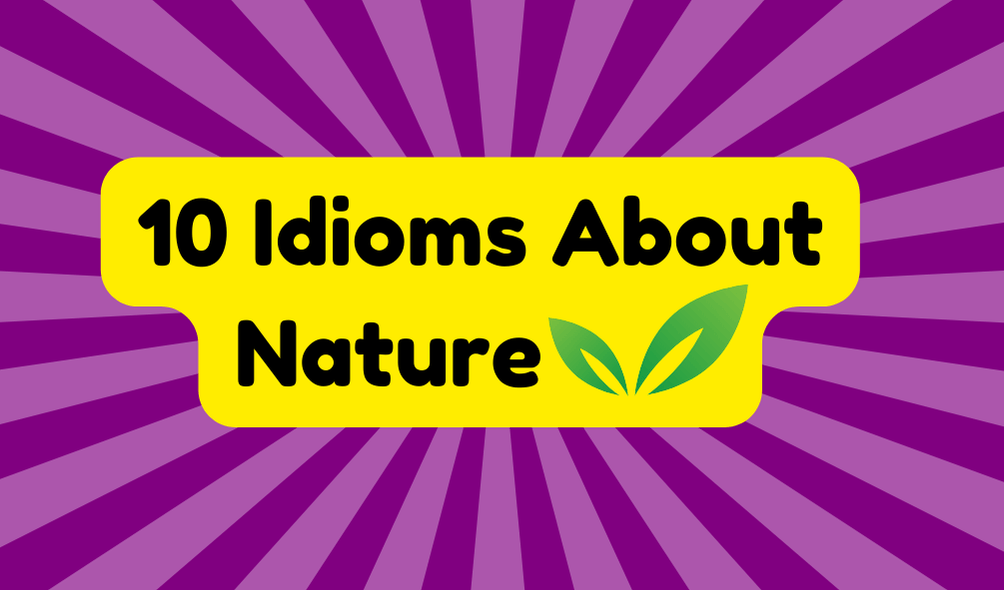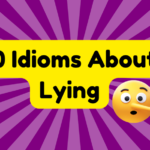Nature’s beauty inspires many idioms we use every day. For instance, “a refreshing change” signifies a positive change, while “making hay while the sun shines” reminds us to seize good opportunities. You might feel “in hot water” when you’re in trouble, and “between a rock and a hard place” highlights tough decisions. Other phrases like “wild goose chase” and “chasing rainbows” suggest futile endeavors. Stick around to discover even more fascinating idioms inspired by nature!
A Breath of Fresh Air
This phrase refers to a revitalizing change or something new that brings relief and positivity to a situation.
Example Sentences:
- After weeks of stressful work, the team felt like their weekend getaway was a revitalizing change.
- The new teacher’s engaging style brought a revitalizing shift to the classroom.
- Switching to a vegan diet has been a rejuvenating change for my health.
Additionally, embracing open and honest dialogue can act as a breath of fresh air in communication, fostering connections and reducing misunderstandings.
Down to Earth
This idiom describes someone who’s practical and realistic, not overly fancy or pretentious.
Example Sentences:
- I appreciate her down-to-earth attitude; she knows how to keep it real.
- The down-to-earth chef makes dishes that everyone can enjoy, without complicated ingredients.
- His down-to-earth approach to life inspires his friends to appreciate the little things.
Getting a Second Wind
This phrase means to regain energy after feeling tired, often during a prolonged activity or effort.
Example Sentences:
- After a quick snack, I got a second wind and finished my homework in record time.
- The marathon runners got a second wind around the final stretch, pushing themselves to the finish.
- Once the music started playing, the crowd seemed to get a second wind and danced all night.
Full of Hot Air
This idiom refers to someone who talks a lot without saying anything of real value or meaning.
Example Sentences:
- Don’t listen to him; he’s full of hot air and rarely backs up his claims.
- The politician’s speech was full of hot air, promising change without any real plans.
- I learned that some people are just full of hot air and never follow through on their ideas.
Walking on Sunshine
This cheerful idiom expresses a feeling of great happiness and positivity, often after a good experience.
Example Sentences:
- After getting the good news, I felt like I was walking on sunshine all day long.
- She’s been walking on sunshine since she found out she got accepted into her dream college.
- The kids were walking on sunshine after winning the championship game last night.
Using idioms related to nature not only adds flair to our language but helps convey emotions and sentiments in a relatable way.
The next time you want to express something, consider reaching for an idiom – it might just be the revitalizing change your conversation needs!
Throwing Caution to the Wind
To “throw caution to the wind” means to take a risk or act without worrying about the possible consequences.
It’s all about living in the moment and embracing spontaneity.
Example Sentences
- After weeks of studying, Jenna decided to throw caution to the wind and go on a spontaneous road trip with her friends.
- Mark threw caution to the wind when he asked his crush out, despite worrying that she might reject him.
- The adventurer threw caution to the wind by deciding to climb the treacherous mountain without proper gear.
Additionally, embracing this mindset can help in building deeper connections with others, as it encourages open communication and vulnerability.
In Hot Water
Being “in hot water” means you’re in trouble or facing a difficult situation, usually because of something you did wrong.
Example Sentences
- After missing the deadline for his project, Jake found himself in hot water with his teacher.
- Maria realized she was in hot water when her parents discovered she’d borrowed the car without asking.
- The company’s CEO was in hot water after the scandal was reported in the news, leading to calls for his resignation.
It’s essential to recognize that friendships can also experience challenges, just like being in hot water in other aspects of life.
Stay tuned for more idioms of nature!
Between a Rock and a Hard Place
This idiom refers to a difficult situation where someone is faced with two equally challenging choices.
It implies being stuck with no clear way out.
Example Sentences
- When Sarah had to choose between taking a job she didn’t like or moving to a new city away from her family, she felt like she was between a rock and a hard place.
- The coach was between a rock and a hard place, needing to win the game but also wanting to let the injured players rest.
- During the meeting, John realized he was between a rock and a hard place, having to defend the company’s actions while not agreeing with them himself.
Understanding idioms can enhance your communication, helping you express complex feelings in a relatable way! This idiom, like many others, shows how language evolves with societal norms and reflects the complexities of human experience.
Making Hay While the Sun Shines
This idiom encourages people to take action and seize opportunities while they’re available. Just like making hay is best done on a sunny day, we should capitalize on favorable conditions.
Example sentences:
- With the exams coming up, I decided to make hay while the sun shines and studied every evening.
- My friend has a great job offer, so she’s planning to make hay while the sun shines and accept it right away.
- We should make hay while the sun shines and finish our project this weekend since the weather will be nice!
A Breath of New Life
This idiom refers to something invigorating or new that revitalizes or improves a situation. It can also describe a person who brings positive change.
Example sentences:
- After weeks of the same routine, going on a weekend trip was a breath of new life.
- The new teacher was a breath of new life, bringing exciting ideas to the classroom.
- I love taking walks in the park; it feels like a breath of new life after being indoors.
Stirring Up a Storm
This idiom means to cause a lot of trouble or controversy, often resulting in a chaotic situation. The phrase conjures the image of a storm brewing, suggesting unrest.
Example sentences:
- His comments in the meeting stirred up a storm among the team members.
- The new policy stirred up a storm in the community, leading to many heated debates.
- When I shared the news, it stirred up a storm of opinions on social media.
The Tip of the Iceberg
This idiom refers to a small visible part of a much larger issue or problem. Just like only a tiny portion of an iceberg is above water, it suggests there’s more than meets the eye.
Example sentences:
- The complaints we’ve received are just the tip of the iceberg; there are many more issues to address.
- His struggles at school are just the tip of the iceberg, reflecting deeper challenges he faces.
- The budget cuts are only the tip of the iceberg when it comes to the district’s financial problems.
Under the Weather
To be “under the weather” means to feel unwell or sick. The phrase is often used to describe a mild illness, like a cold.
Example sentences:
- I didn’t go to school today because I was feeling a bit under the weather.
- She looks under the weather; I hope it’s just a temporary bug.
- Even though he was feeling under the weather, he still managed to finish his homework.
These idioms not only reflect everyday situations but also show how nature provides us with rich metaphors to convey our thoughts.
Walking on Sunshine
This idiom means to feel extremely happy and carefree, like you’re floating on a blissful cloud.
Example Sentences:
- After receiving her acceptance letter to college, Jenna felt like she was walking on sunshine all day.
- With the sun shining and the birds chirping, Mark was walking on sunshine during his morning jog.
- The surprise party his friends threw for him made Tom feel like he was walking on sunshine.
Under the Weather
This idiom refers to feeling unwell or sick, similar to how gloomy weather can bring down your mood.
Example Sentences:
- Maria couldn’t join us for the picnic because she was feeling a bit under the weather.
- I’ve been under the weather lately, which is why I missed school last week.
- It’s hard to be energetic when you’re feeling under the weather like I’m right now.
Break the Ice
To “break the ice” means to initiate conversation in social situations that may be awkward or tense, much like how the sun breaks through a chilly morning.
Example Sentences:
- At the party, Sarah told a funny joke to break the ice with the new guests.
- Meeting new classmates can be tough, but games are a great way to break the ice.
- A friendly smile is often enough to break the ice and start a conversation.
In the Same Boat
This idiom means to be in the same situation or predicament as someone else, similar to being together on a boat facing the same waves.
Example Sentences:
- Since we both failed the test, we were definitely in the same boat.
- The team realized they were in the same boat when they missed the project deadline.
- All of us are in the same boat, so let’s work together to find a solution.
A Breath of Invigorating Air
This phrase describes something that’s new and invigorating, just like stepping outside to enjoy fresh air after being indoors for too long.
Example Sentences:
- The new student was a breath of invigorating air, bringing exciting ideas to our group.
- After several hours of studying, taking a walk was a breath of invigorating air for Anna.
- The new rules introduced by our teacher felt like a breath of invigorating air for the class.
The Ball is in Your Court
This idiom indicates that it’s now someone else’s turn to take action or make a decision, like the next move in a tennis game.
Example Sentences:
- I’ve given you all the information; now the ball is in your court.
- He made his feelings clear, so now the ball is in her court to respond.
- We’ve presented our plan; now the ball is in the principal’s court to decide.
These idioms not only offer a glimpse into the beauty of language but also reflect our relationship with nature and emotions.
Whether we’re walking on sunshine or feeling under the weather, these expressions help us articulate our experiences in a creative way!
The Calm Before the Storm
This idiom refers to a peaceful or quiet period before a moment of chaos or trouble.
It’s like sensing that something unsettling is about to happen, even when things seem calm.
Example Sentences
- As the team prepared for the big presentation, there was a calm before the storm, with everyone feeling optimistic despite the high stakes.
- The park was quiet, and the birds were singing; it felt like the calm before the storm before the inevitable rain started.
- We enjoyed a lovely dinner together, but I could sense the calm before the storm in my friend’s demeanor as he prepared to share bad news.
Understanding idioms like “the calm before the storm” helps us communicate more vividly, capturing the essence of our experiences with just a few words.
Keep an eye out for more idioms inspired by nature!
Wild Goose Chase
A “wild goose chase” refers to a futile or hopeless endeavor. It typically describes a situation where someone is searching for something that’s either nonexistent or extremely difficult to find.
Example Sentences
- After searching for the lost keys for hours, I realized it had turned into a wild goose chase.
- Trying to get the latest video game on release day felt like a wild goose chase, with long lines and sold-out shelves everywhere.
- His attempt to convince the coach to let him play was just a wild goose chase—he knew there was no chance.
Chasing Rainbows
A wild goose chase refers to a futile pursuit or an effort that’s pointless. It emphasizes the idea that you’re putting in time and energy without any hope of success or payoff.
- I thought I could find my lost dog in the park, but it turned into a wild goose chase.
- Trying to convince him to change his mind was just a wild goose chase; he’s set in his ways!
- The detective realized the clues led to a dead end; it was a complete wild goose chase.
Pie in the Sky
Pie in the sky is an expression used to describe a hope or dream that’s unrealistic or unlikely to happen. It highlights the idea of something that sounds great but isn’t practical.
- Her idea of traveling the world after graduation sounds like pie in the sky unless she starts saving now.
- Many startups promise pie in the sky profits; not all of them make it.
- Dreaming of becoming a movie star is nice, but it feels more like pie in the sky without connections in the industry.
Chasing Shadows
Chasing shadows refers to pursuing something elusive or trying to grasp something that can’t be caught. It emphasizes the futility of such pursuits.
- He spent years chasing shadows trying to find a band that existed only in an old memory.
- Chasing shadows will get you nowhere; focus on what’s real and achievable.
- My friend is always chasing shadows, believing he can win the lottery; it’s time for him to think practically.
Craving the Moon
Craving the moon is used to describe a desire for something that’s beyond reach or impossible to obtain. It emphasizes the rarity or unattainability of the desire.
- She’s always dreaming of owning a mansion, but it’s really just craving the moon for her budget.
- His ambition to invent a time machine feels like craving the moon; it’s a nice thought but highly unlikely.
- Craving the moon sometimes leads to disappointment; it’s crucial to set realistic goals.
Between a Rock and a Hard Place
This idiom describes being in a tough situation where you have to choose between two difficult options. It showcases the dilemma of feeling stuck.
- I’m between a rock and a hard place: should I take the job that pays well but I hate, or keep looking?
- The student was between a rock and a hard place when he’d a project due while preparing for finals.
- Facing a decision between moving away for a job or staying near family, she felt between a rock and a hard place.
Each of these idioms gives a different angle on the idea of chasing something, whether it’s a dream, an ambition, or a difficult choice.
Sometimes, it’s helpful to reflect on what we’re truly pursuing and how realistic it is.
Weathering the Storm
To face a difficult situation bravely and do what’s necessary, even if it’s unpleasant.
- Sometimes you just have to bite the bullet and start studying for that big exam.
- I didn’t want to go to the dentist, but I knew I’d to bite the bullet and make an appointment.
- During tough times, it’s important to bite the bullet and stay positive.
Keep your chin up
To remain positive and optimistic even when things are tough.
- When she didn’t get picked for the team, her friends told her to keep her chin up.
- It’s hard to keep your chin up after failing the test, but you can always try again.
- My coach always says to keep your chin up and work harder for the next game.
Weather the storm
To endure a difficult situation and get through it.
- Our family had to weather the storm after Dad lost his job, but we stayed strong together.
- Schools were closed due to the heavy snow, but everyone just had to weather the storm and wait for the roads to clear.
- By focusing on our goals, we can weather the storm of this challenging project.
Every cloud has a silver lining
Even in difficult situations, there’s always something positive to be found.
- Losing my job felt terrible at first, but I found a new passion; every cloud has a silver lining.
- Even after the breakup, Jane reminded herself that every cloud has a silver lining and she’d find love again.
- The team lost the game, but the experience was great; every cloud has a silver lining.
In the eye of the storm
Caught in the middle of a difficult situation or crisis, but experiencing a temporary period of calm.
- It was stressful to start a new school, but I felt calm in the eye of the storm when my friends showed support.
- During the argument, I tried to stay calm, feeling like I was in the eye of the storm.
- Even in the eye of the storm, I’d to make decisions that would affect my future.
Make hay while the sun shines
To take advantage of favorable conditions or opportunities while they last.
- I decided to make hay while the sun shines and volunteered for the summer internship.
- With the nice weather this weekend, let’s make hay while the sun shines and go for a hike.
- The farmers are making hay while the sun shines before the rainy season come—
Using these idioms helps communicate our feelings and experiences in a relatable way.
Whether you’re feeling overwhelmed or optimistic, remember to embrace these phrases that capture the essence of weathering the storms of life!






